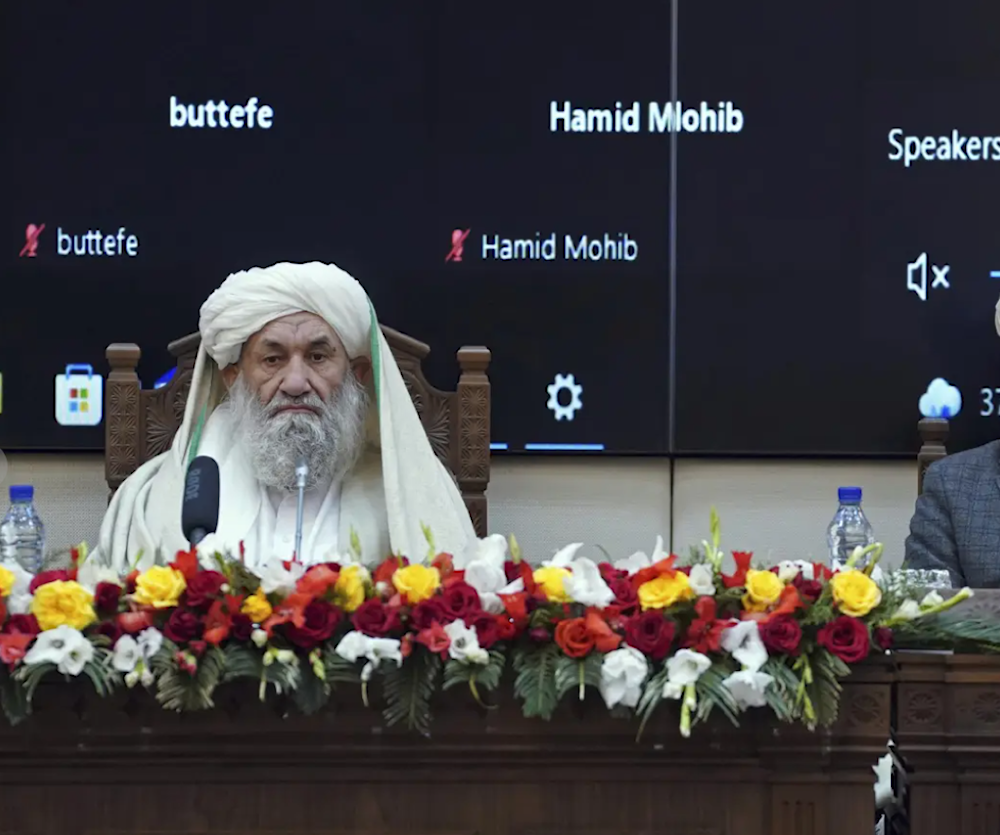Afghan PM slams Pakistan's 'unilateral' mass deportations
Islamabad had earlier launched a deportation campaign to deport more than 800,000 Afghans by the end of April.
-
 Taliban Prime Minister Mohammad Hasan Akhund speaks during an economic conference at the former Presidential Palace in Kabul on January 19, 2022 (AP)
Taliban Prime Minister Mohammad Hasan Akhund speaks during an economic conference at the former Presidential Palace in Kabul on January 19, 2022 (AP)
Afghanistan's prime minister decried on Saturday Pakistan's "unilateral measures" in forcefully deporting tens of thousands of Afghans since April 1.
Islamabad had earlier launched a deportation campaign to deport more than 800,000 Afghans by the end of April. The targeted Afghans are those who have had their permits canceled, including some born in Pakistan or who have lived in the country for decades.
Amid the campaign, convoys of Afghan families have headed to border towns each day, in fear of the "humiliation" of raids, arrests, or being separated from family members.
Pakistan's top diplomat, Ishaq Dar, visited Kabul on Saturday, meeting with Afghan Taliban leaders, including Prime Minister Hasan Akhund and Foreign Minister Amir Khan Muttaqi.
During his meeting with Dar, Akhund expressed that rather than collaboration, "Pakistan's unilateral measures are intensifying the problem and hindering progress toward a solution."
In an X post, he encouraged Pakistan's administration to "facilitate the dignified return of Afghan refugees."
Foreign Minister Muttaqi had previously voiced "deep concern and disappointment over the situation and forced deportation of Afghan refugees in Pakistan," according to the ministry's deputy spokeswoman Zia Ahmad.
Ahmad further stated that Dar had promised officials that Afghans "will not be mistreated."
Afghans in Pakistan have experienced weeks of arbitrary arrests, extortion, and harassment from officials.
According to Islamabad, about 85,000 people have already crossed into Afghanistan, with convoys of Afghan families traveling to border crossings every day, fearing searches, arrests, or separation from loved ones.
Tallal Chaudhry, Pakistan's deputy interior minister, told a press conference on Friday that there would be no mercy or extension of the deadline.
Tensions between Pakistan and Afghanistan have worsened since the Taliban's return to power in 2021, with Pakistan blaming Kabul for harboring militants behind a surge in cross-border attacks—an allegation the Taliban government denies.
Second phase of deportations
The United Nations reported that close to three million Afghans have found refuge in Pakistan over the years, escaping ongoing conflicts.
In the 1990s, Pakistan was among the few countries to formally recognize the Taliban’s initial rule and has since faced criticism for allegedly supporting the group’s insurgency against NATO forces. However, relations have sharply declined, especially with rising violence in Pakistan’s border regions.
During the first wave of deportations in 2023, hundreds of thousands of undocumented Afghans were expelled within weeks.
In a second phase announced in March, Pakistan revoked the residency permits of over 800,000 Afghans, instructing those awaiting relocation to other countries to leave by the end of April.
Additionally, more than 1.3 million Afghans holding UN-issued Proof of Registration cards have been ordered to vacate Islamabad and nearby Rawalpindi.

 3 Min Read
3 Min Read










